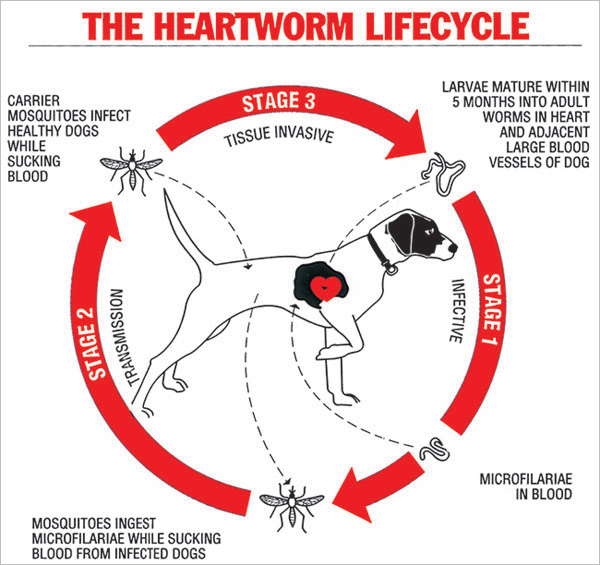THE DOG AND CAT HEARTWORM, DIROFILARIAIMMITIS
The dog heartworm Dirofilariaimmitis is becoming an increasingly significant health problem for dogs. Although heartworm in Australia has in the past been considered to be mainly a problem of tropical and subtropical coastal regions, in recent decades it has become increasingly prevalent in more southern areas. Over 30 species of animals can be infected with the disease, including cats, foxes, ferrets, sea lions and in extremely rare cases, humans.
Where is heartworm found in Australia?
Heartworm is more prevalent in areas with large numbers of mosquitoes and a warmer climate. Although no prevalence studies have been conducted in dogs, fox studies have shown that around 9% of foxes in the Sydney surrounds, and around 7% in the Melbourne surrounds carry heartworm, acting as a source of infection for city pets. So any pet not on heartworm prevention could have a one-in-ten chance of being infected with heartworm.
HOW DO PETS BECOME INFECTED WITH HEARTWORM?
Heartworm is transmitted from infected animals to healthy animals by mosquito bites.
- When mosquitoes bite an infected animal to take a blood feed, they ingest microscopic heartworm larvae known as microfilariae which are circulating in the blood of the infected animal. These microfilariae then develop further inside the mosquito and are passed onto the final host animal during another blood feed by the infected mosquito.
- This larval stage (1mm long) of the heartworm migrates through the animal's tissues and develops to an immature adult which finally enters the blood stream and moves to the heart; they mature to adults (20-30cm long) in about 6 months. The adults can then be found in the heart and major blood vessels. The adults mate, and the female produces millions of microfilariae to circulate in the peripheral blood to renew the cycle.
- In the correct host animal species - eg. dogs, foxes, severe infestations can result in up to 100 worms clogging up the right chamber of the heart and the artery leading to the lungs.
SYMPTOMS OF HEARTWORM DISEASE
- Infection can occur at any age but because it takes a number of years for symptoms to develop the disease is most often diagnosed in dogs 3 to 8 years old. The disease is seldom diagnosed in a dog less than 1 year of age because the young worms take up to 7 months to mature following initial infection in a dog.
- The worms mainly cause disease in the lungs and heart, which is why exercise intolerance and tiredness is the main early sign, but the migrating worms can also damage other parts of the body.
- Your pet may show absolutely no clinical signs for up to five years as the worms slowly grow. Later in the disease, coughing, collapse, lack of energy, fluid in the abdomen, bleeding from the nose and difficulty breathing can occur.
- Heartworm can also result in sudden death, with no warning signs, due to heart failure or diseases in other affected organs such as the kidneys.
Symptoms of heartworm disease can include:
- Lethargy and loss of energy when exercising
- Bleeding from the nose
- Coughing or difficulty breathing
- Weight loss
- Sudden collapse
- Increased thirst (due to kidney disease)
CAN CATS GET HEARTWORM DISEASE?
Heartworm disease in cats is very different from heartworm disease in dogs. As the cat is an atypical host for heartworms, most worms in cats do not survive to the adult stage. Cats with adult heartworms typically have just one to three worms, and many cats affected by heartworms have no adult worms. While this means heartworm disease often goes undiagnosed in cats, it's important to understand that even immature worms cause real damage. Furthermore, the medication used to treat heartworm infections in dogs cannot be used in cats, so prevention is the only means of protecting cats from the effects of heartworm disease.
HOW IS HEARTWORM DISEASE DIAGNOSED?
Your vet can diagnosis heartworm disease using one of more of the following:
1 - The pet's symptoms.
2 - The results of a physical examination.
3 - Blood Tests - this is the main method of diagnosing a heartworm infection.
4 - Xrays
5 - Ultrasound
Heartworm Disease - Prevention is much better than the cure!
1 - Heartworm is quite simple to prevent. If your dog is infected with the disease, however, treatment becomes complex and often dangerous, particularly in the later stages of the disease when the heart, lungs and other organs may be severely damaged. Furthermore, surgery may be required to remove the adult worms.
2 - When you consider how dangerous heartworm can be, and the complex treatment plan the disease often requires, the importance of heartworm prevention becomes very obvious. Heartworm is easily prevented and the preventatives are effective and very cheap - certainly much cheaper than treating the disease.
3 - In Australia, it is recommended to use heartworm preventative all year round as it is impossible to reliably estimate a “ mosquito season ”.
4 - Dogs should start heartworm prevention by three months of age, but some products are safe to use on puppies from two weeks of age.
5 - Many vets now also recommend using heartworm prevention in cats, despite their lower risk of serious disease from heartworms. The medication used to treat heartworm infections in dogs cannot be used in cats, so prevention is the only means of protecting cats from the effects of heartworm disease.
Beware of products advertised as an “ Allwormer ”. This term refers to treatment of intestinal worms only, and many products sold for intestinal worms do not prevent heartworm. You must check the product information to be sure you have selected a product that clearly indicates it can be used for heartworm prevention.
WHEN SHOULD A DOG HAVE A HEARTWORM TEST?
There are two situations where a heartworm test is required:
1. Dogs over six months of age should be tested for heartworm before starting a preventative program. Heartworm preventatives only kill larvae at specific stages of their life, so missing regular doses may allow some larvae to survive to adulthood.
2. If you have any suspicion that your dog has been off heartworm prevention for more than one month or if you missed a dose of heartworm medication, you should seek advice from your vet as soon as possible about a heartworm test - don't wait for clinical signs of disease to develop.


























































_11132025_205157.png)



















